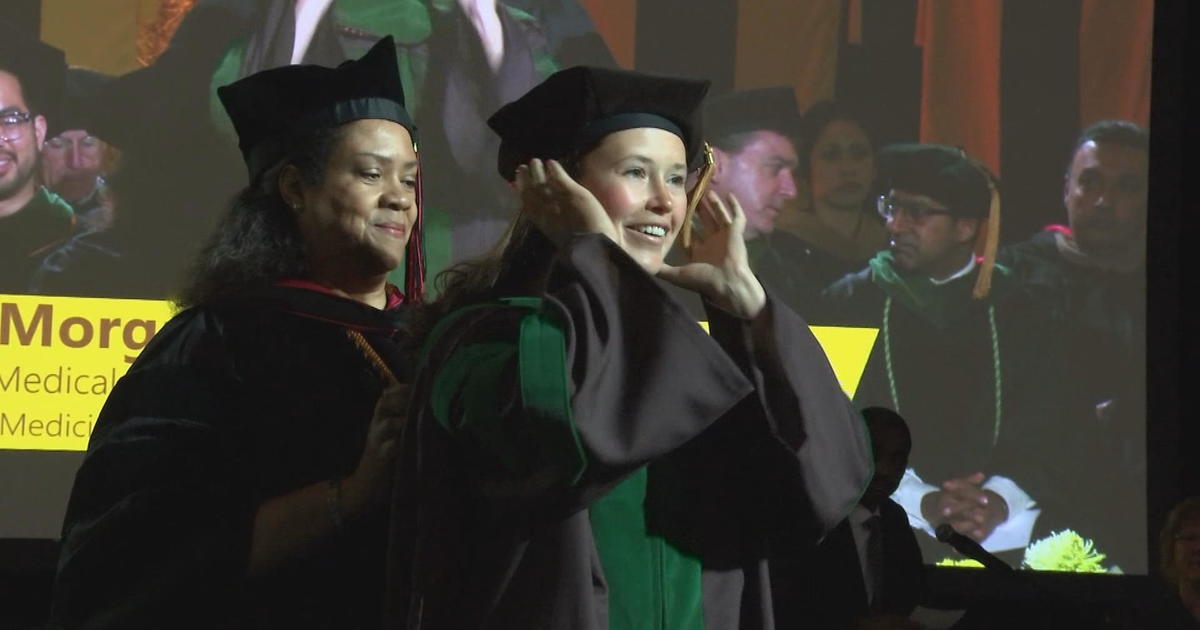After 25-Year Search, New Jersey Woman Finds Birth Mother
PARAMUS, N.J. (AP) — In July, a photo of two women's clasped hands appeared on Jean Hegg's Facebook page. One belonged to the 49-year-old Hegg, a longtime northern New Jersey resident, who was born in Canada; the other to her biological mother, whom Hegg had finally located after a search that lasted 25 years.
Two weeks later, in the dining room of her home in Paramus, Hegg recalled that emotional and very-long-awaited meeting, while sitting at a table in front of folders filled with more than two decades of paperwork.
"Oh, how can I describe it?" she asked, staring down at copies of letters dating back to 1991. "My meeting with her was just amazing, joyous . the beginning of a new, wonderful journey. A new journey for both of us."
New laws, societal changes and increased search capabilities on the Internet have made it easier than it once was for curious adoptees to reunite with birth parents who are willing to do so. But for Hegg and other adoptees like her, who were not born in the United States, such searches are often complicated by language barriers, awkward cultural differences and misinformation intentionally placed on records decades ago to protect the privacy of the mother.
Even the 9/11 attacks have played a part, since, for security reasons, copies of birth records and other forms of identification are not as freely available today as they were before 2001.
Hegg already had her birth certificate when she began her search in 1991. But what she did not know, until two years ago, was that the line on it that was most crucial to finding her birth mother— the woman's name —was an alias created to protect her identity.
"I was born on May 13, 1967," Hegg told The Record. "The name on my papers was Marie Chantal Caron. My mother was identified as 'Caron' on my birth certificate and 'Johanne Caron' on other paperwork. But that wasn't her name. So, I spent more than 20 years trying to find someone who didn't even exist."
There were additional complications: The Sister Mary Eugene Foundation, the Catholic agency that took in Hegg when she was born, closed its doors in 1974, when it merged with the Children's Aid and Adoption Society of New Jersey. The Sister Mary Eugene Foundation helped foster adoptions by New Jersey couples of children under the care of the Prince County Welfare Agency in Canada. Although Hegg was born in Montreal, her records were stored a thousand kilometers away in Gaspé, her birth mother's hometown.
"Imagine a jigsaw puzzle," she said, "with all the key pieces missing."
Hegg recalled a fairly normal childhood in northern New Jersey. Her adoptive parents were good to her and her siblings, she said, adding, "My life wasn't bad, but I always felt something was missing. I didn't look like anyone else in my family. My personality . well, let's just say I was different. My adoptive parents knew, from the time that I was a teenager, that I would look for my (birth) mother and they seemed fine with it."
That search began in earnest in 1991. Hegg obtained a Canadian phone book, wrote letters to everyone with the surname "Caron" and waited endlessly for responses that never arrived.
"I wrote the same letter, over and over," Hegg said, shaking her head. "I think 'Caron' is the 'Smith' of Canada. And I wasn't even sure where to look. By that point, more than 20 years had passed. I knew she could be anywhere."
Then, in 2013, Hegg began searching again, with a renewed fervor.
"On one day alone," she said, "I wrote 75 letters. I think I wrote to every social services agency in the country. But, again, I didn't get a single response. Nothing. By this point, though, tracking down the agencies was easier, because I had the Internet.
"I also felt I was mentally ready," she added, "and that was so important. I had wanted to know that I could deal with the possibility that I might never find her, that she might have died, or that, for whatever reasons, she didn't want to meet me."
Hegg also looked to social media. She found dozens of Johanne Carons on Facebook and sent each of them cautious messages. "No one responded," she said. "But then, one day, I was doing another online search. I found a post on an adoption-themed message board . and my heart stopped."
The message, written in French, said that a "Johanne Caron" was looking for a "Chantal Caron"— both of which were identified, parenthetically, as "noms fictive" —fictitious names.
Hegg stared endlessly at the post.
The message, she said, had been there for 10 years. Unfortunately, Hegg's birth mother, who didn't know how to use a computer at that time— a friend helped her post her message —neglected to provide any contact information.
In June of this year, Hegg was discussing her search with Alina Chicoine, an online acquaintance she met through yet another adoption website. Chicoine urged Hegg to once again contact the agency that handled her adoption. Hegg had written to this agency years earlier and not gotten a response. But this time around was different, Chicoine explained. According to a new law in Quebec province, when an adoptee submits a search request, the agency must make one attempt to contact the birth parent and determine if there is interest in making contact with the child.
Hegg called and spoke to a caseworker who put her on hold. Then, moments later, the woman returned to the phone and said, "I have your file right here. We found your birth mother two years ago, but we never made contact with her."Hegg couldn't believe how quickly the woman returned to the phone.
"She told me my file was sitting in a pile somewhere," Hegg said. "Apparently, whoever had been handling my case had left the agency and her replacement, if she even had one, dropped the ball. The woman I spoke to told me how overworked they were. I guess I understood. I know how understaffed social services can be. I was disappointed. But I was also thrilled. Had I finally found her?"
Yes, she had.
And within days, Hegg and her birth mother, whose real name is Bonita Tapp, were reunited on Skype, staring at each other and overwhelmed by what they saw. The women have identical features, the same mannerisms . even their hairstyles are similar.
"I was standing behind Jean, making a video of it as it happened," Hegg's husband, Roy, recalled. "And it was really something. She cried. Her mother cried. I cried."
And they wept all over again the following week, Jean added, when they met face to face in Montreal.
"I'm not even sure I can describe it," Hegg said, her eyes once again welling with tears. "She held me and I literally couldn't breathe. My knees turned to mush. She told me she never got to hold me when I was born. She was only 16. She didn't want to give me away, but her father made her do it."
Initially, Tapp, who speaks only French, was also at a loss for words.
"After 49 years of waiting and hoping for this to happen," she eventually told The Record, through an interpreter, "it is too much joy to explain."
Tapp said she has always hoped to be reunited with Jean, because she never wanted to give her up. Her pregnancy, she noted, "was a secret well kept by my sister and cousins until 8½ months."
(Copyright 2016 The Associated Press. All rights reserved. This material may not be published, broadcast, rewritten or redistributed.)



